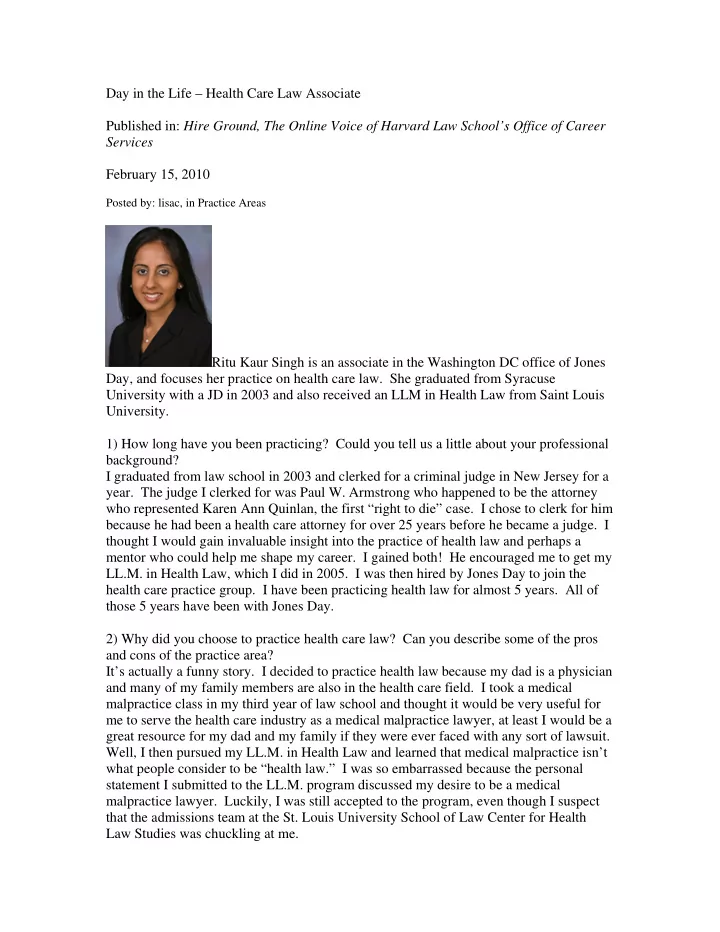

Day in the Life – Health Care Law Associate Published in: Hire Ground, The Online Voice of Harvard Law School’s Office of Career Services February 15, 2010 Posted by: lisac, in Practice Areas Ritu Kaur Singh is an associate in the Washington DC office of Jones Day, and focuses her practice on health care law. She graduated from Syracuse University with a JD in 2003 and also received an LLM in Health Law from Saint Louis University. 1) How long have you been practicing? Could you tell us a little about your professional background? I graduated from law school in 2003 and clerked for a criminal judge in New Jersey for a year. The judge I clerked for was Paul W. Armstrong who happened to be the attorney who represented Karen Ann Quinlan, the first “right to die” case. I chose to clerk for him because he had been a health care attorney for over 25 years before he became a judge. I thought I would gain invaluable insight into the practice of health law and perhaps a mentor who could help me shape my career. I gained both! He encouraged me to get my LL.M. in Health Law, which I did in 2005. I was then hired by Jones Day to join the health care practice group. I have been practicing health law for almost 5 years. All of those 5 years have been with Jones Day. 2) Why did you choose to practice health care law? Can you describe some of the pros and cons of the practice area? It’s actually a funny story. I decided to practice health law because my dad is a physician and many of my family members are also in the health care field. I took a medical malpractice class in my third year of law school and thought it would be very useful for me to serve the health care industry as a medical malpractice lawyer, at least I would be a great resource for my dad and my family if they were ever faced with any sort of lawsuit. Well, I then pursued my LL.M. in Health Law and learned that medical malpractice isn’t what people consider to be “health law.” I was so embarrassed because the personal statement I submitted to the LL.M. program discussed my desire to be a medical malpractice lawyer. Luckily, I was still accepted to the program, even though I suspect that the admissions team at the St. Louis University School of Law Center for Health Law Studies was chuckling at me.
One of the pros of being a health care lawyer is that you are serving an industry. That means you can practice almost any subspeciality within health law and still being “serving the industry.” The health care industry is heavily regulated. Therefore, the industry needs all types of lawyers that are familiar with the laws that affect hospitals, physicians, pharmaceutical companies, etc. Health care lawyers can specialize in employment law, mergers and acquisitions, bond financing, fraud & abuse, litigation, compliance, etc. The list goes on and on. I am too biased to think of a con. I love what I do! 3) What type of work do you do on a daily basis? At Jones Day, my practice consists of representing health care providers, such as hospitals and health systems, in civil and criminal investigations of alleged violations of the Medicare antikickback law, the Stark Law, and the False Claims Act. What does that mean? On any given day, I may be involved with providing regulatory and compliance advise to hospitals, laboratories, medical device companies, and medical practices; I may be drafting template contracts for one of my clients so they can use them in their relationships with health care professionals; or I may be drafting company policies related to such things as charity care, physician courtesy, or how to handle a government investigation. It doesn’t stop there. I conduct internal investigations, draft sections of bond statements that are related to the health care laws, and assist with all aspects of litigating a case. Needless to say, I am never bored! 4) Is your work typical of the field? What might other health care attorneys work on? My work is somewhat typical of the field. However, most people do not have as diverse a practice as I do. Many health care lawyers subspecialize in only one particular area. For example, some health care attorneys only work on deals and are truly transactional lawyers who serve health care clients. Some health care lawyers only work on antitrust matters for the health care industry. I am very fortunate to have a number of different types of matters cross over my desk. 5) What do you think is the most valuable skill set for an attorney interested in health care law? The most valuable skill set for an attorney interested in health care law is flexibility and the desire to learn. The laws affecting the health care industry are forever changing. Therefore, there is always room for new interpretations and applications of the laws. As health care lawyers, we have to keep up with these changes in order to properly counsel our clients. That is why so many health care lawyers publish articles on cutting edge topics. 6) Do you have any additional words of advice for a law student? Even though I got my LL.M. in Health Law, it is not necessary to be a health care lawyer. I think I am only one of two or three people at Jones Day with an LL.M. in Health Law. When selecting a practice group, you should pick one that will have longevity. There will always be hospitals and physicians. There will always be laws regulating how hospitals and physicians can do business. I will therefore always have a
place as a lawyer because I have a knowledge base that a general practitioner would not have.
Recommend
More recommend